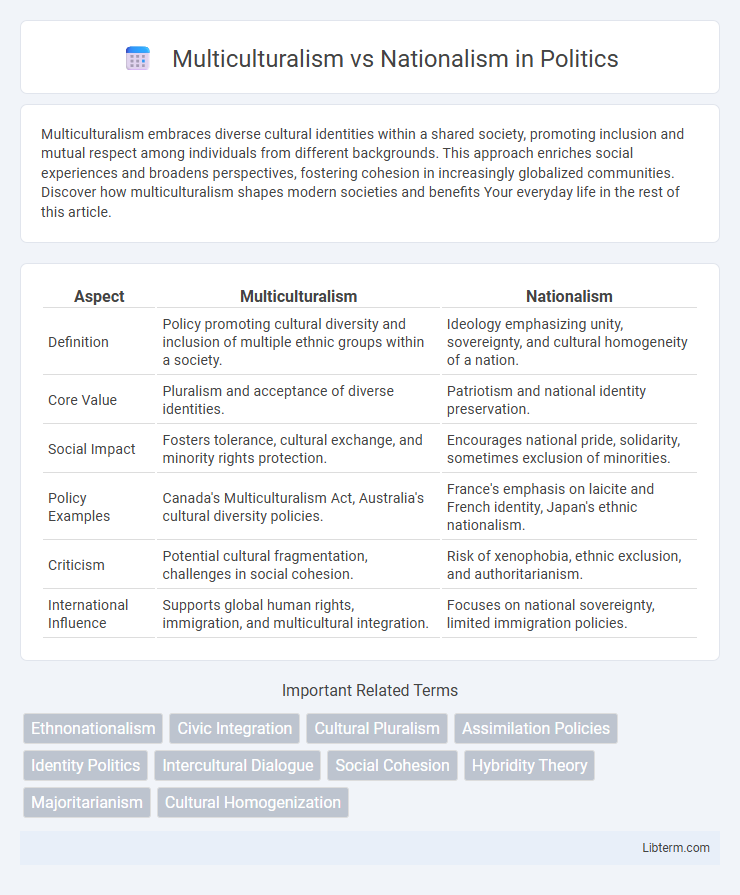Multiculturalism embraces diverse cultural identities within a shared society, promoting inclusion and mutual respect among individuals from different backgrounds. This approach enriches social experiences and broadens perspectives, fostering cohesion in increasingly globalized communities. Discover how multiculturalism shapes modern societies and benefits Your everyday life in the rest of this article.
Table of Comparison
| Aspect | Multiculturalism | Nationalism |
|---|---|---|
| Definition | Policy promoting cultural diversity and inclusion of multiple ethnic groups within a society. | Ideology emphasizing unity, sovereignty, and cultural homogeneity of a nation. |
| Core Value | Pluralism and acceptance of diverse identities. | Patriotism and national identity preservation. |
| Social Impact | Fosters tolerance, cultural exchange, and minority rights protection. | Encourages national pride, solidarity, sometimes exclusion of minorities. |
| Policy Examples | Canada's Multiculturalism Act, Australia's cultural diversity policies. | France's emphasis on laicite and French identity, Japan's ethnic nationalism. |
| Criticism | Potential cultural fragmentation, challenges in social cohesion. | Risk of xenophobia, ethnic exclusion, and authoritarianism. |
| International Influence | Supports global human rights, immigration, and multicultural integration. | Focuses on national sovereignty, limited immigration policies. |
Understanding Multiculturalism: Key Concepts and Principles
Multiculturalism promotes cultural diversity and inclusion by recognizing and respecting multiple cultural identities within a society, fostering social cohesion and mutual understanding. Key principles include equality, cultural pluralism, and protection of minority rights to ensure all groups maintain their distinct traditions without assimilation pressures. The approach contrasts with nationalism, which often emphasizes a unified national identity and cultural homogeneity.
Defining Nationalism: Ideologies and Expressions
Nationalism is defined by a political ideology centered on the advancement of a distinct national identity, often emphasizing sovereignty, cultural unity, and self-governance. It manifests through expressions such as patriotic symbols, national holidays, and policies promoting linguistic and cultural homogeneity. Key variants include civic nationalism, which focuses on shared citizenship and values, and ethnic nationalism, which prioritizes common ancestry and heritage.
Historical Evolution of Multiculturalism and Nationalism
The historical evolution of multiculturalism traces back to the post-World War II era, marked by increased migration and the rise of civil rights movements advocating for cultural diversity and inclusion within democratic states. Nationalism, with roots in the 18th and 19th centuries, emerged during the era of nation-state formation, emphasizing shared language, culture, and identity to unify populations, often in reaction to imperial rule and colonialism. Over time, these ideologies have clashed and combined in varying degrees, influencing immigration policies, social integration, and political discourse worldwide.
Social Integration vs Cultural Preservation
Multiculturalism promotes social integration by encouraging diverse communities to coexist while maintaining their unique cultural identities, fostering mutual respect and societal cohesion. Nationalism emphasizes cultural preservation by prioritizing a unified national identity, often seeking to protect traditional customs and values from external influences. Balancing multicultural integration with cultural preservation requires policies that both support inclusivity and respect the heritage of different groups within a nation.
Political Impacts: Governance and Policy Approaches
Multiculturalism fosters inclusive governance by promoting policies that recognize cultural diversity, leading to enhanced social cohesion and representation of minority groups in political processes. Nationalism influences governance through policies prioritizing national identity and sovereignty, often resulting in stricter immigration controls and cultural assimilation efforts. The political impact of these approaches shapes legislative frameworks, public resource allocation, and the overall stability of democratic institutions.
Economic Outcomes: Diversity and National Identity
Multiculturalism fosters economic growth by attracting diverse talent, enhancing innovation, and expanding global market access. Nationalism may limit economic opportunities by promoting protectionism and restricting immigration, potentially reducing workforce diversity and productivity. Empirical studies indicate that countries embracing multiculturalism tend to experience higher GDP growth and more robust entrepreneurial activity compared to nationalist economies.
Education Systems: Promoting Unity or Diversity?
Education systems rooted in multiculturalism emphasize diverse curricula that celebrate cultural differences, fostering inclusivity and mutual respect among students from varied backgrounds. Nationalism-centered education often prioritizes a unified national identity, promoting shared history and values to strengthen social cohesion. Balancing these approaches remains critical for developing citizens who appreciate diversity while maintaining a collective sense of belonging.
Media Representation: Narratives and Stereotypes
Media representation often shapes public perception of multiculturalism and nationalism through distinct narratives and stereotypes. Multiculturalism is frequently portrayed with emphasis on diversity, inclusion, and cultural exchange, yet sometimes reduced to simplistic tokenism or exoticism. Nationalism media narratives typically focus on themes of sovereignty and identity but risk perpetuating exclusionary stereotypes and fostering societal divisions.
Conflict and Cooperation: Case Studies from Around the World
Multiculturalism and nationalism often generate conflict when exclusive national identities clash with diverse cultural expressions, evident in the ethno-political tensions in Belgium and the Kurdish struggle across Turkey, Syria, and Iraq. Conversely, cooperation emerges in countries like Canada and Singapore, where institutional frameworks support cultural diversity while fostering a shared national identity. These case studies underscore how legal recognition, political inclusion, and dialogue mechanisms can mitigate conflict and promote coexistence between multiculturalism and nationalism.
Future Challenges and Opportunities for Cohesion
Future challenges in multiculturalism and nationalism include managing social integration while addressing identity politics and economic disparities that fuel division. Opportunities for cohesion arise through inclusive policies that promote cross-cultural dialogue, equitable resource distribution, and education fostering mutual respect. Technological advancements also enable platforms for multicultural interaction, enhancing understanding and collaboration within diverse societies.
Multiculturalism Infographic

 libterm.com
libterm.com